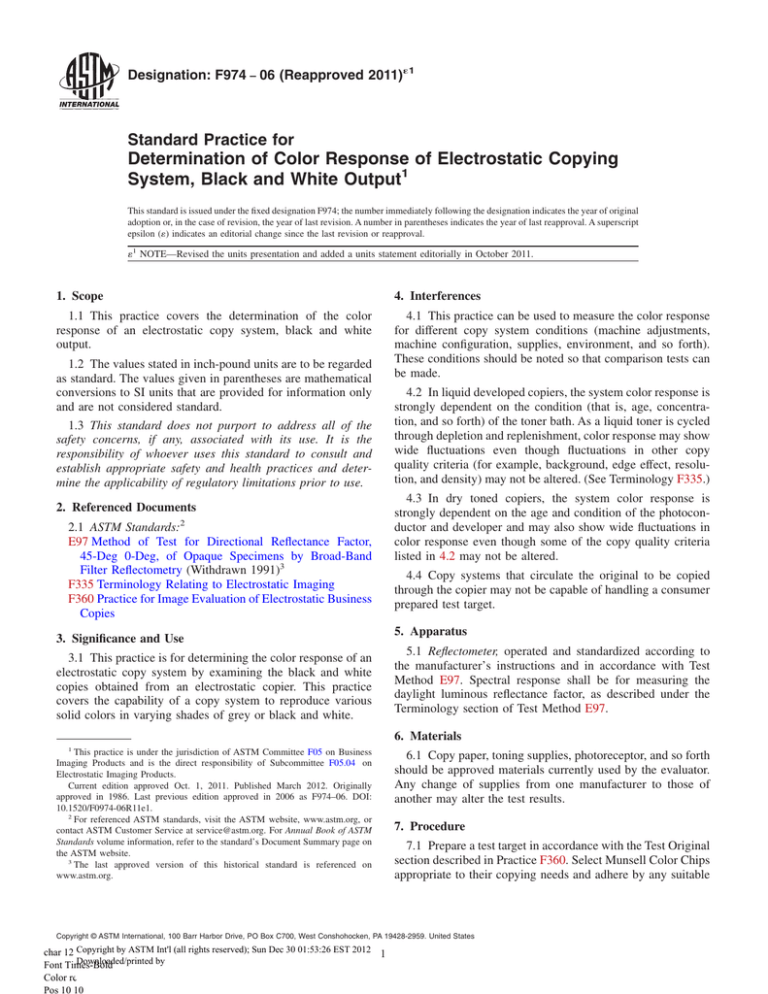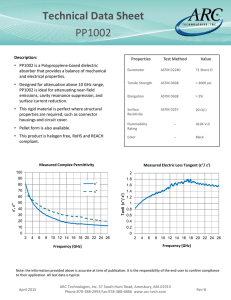
Designation: F974 − 06 (Reapproved 2011)´1
Standard Practice for
Determination of Color Response of Electrostatic Copying
System, Black and White Output1
This standard is issued under the fixed designation F974; the number immediately following the designation indicates the year of original
adoption or, in the case of revision, the year of last revision. A number in parentheses indicates the year of last reapproval. A superscript
epsilon (´) indicates an editorial change since the last revision or reapproval.
´1 NOTE—Revised the units presentation and added a units statement editorially in October 2011.
1. Scope
4. Interferences
1.1 This practice covers the determination of the color
response of an electrostatic copy system, black and white
output.
4.1 This practice can be used to measure the color response
for different copy system conditions (machine adjustments,
machine configuration, supplies, environment, and so forth).
These conditions should be noted so that comparison tests can
be made.
1.2 The values stated in inch-pound units are to be regarded
as standard. The values given in parentheses are mathematical
conversions to SI units that are provided for information only
and are not considered standard.
1.3 This standard does not purport to address all of the
safety concerns, if any, associated with its use. It is the
responsibility of whoever uses this standard to consult and
establish appropriate safety and health practices and determine the applicability of regulatory limitations prior to use.
2. Referenced Documents
2.1 ASTM Standards:2
E97 Method of Test for Directional Reflectance Factor,
45-Deg 0-Deg, of Opaque Specimens by Broad-Band
Filter Reflectometry (Withdrawn 1991)3
F335 Terminology Relating to Electrostatic Imaging
F360 Practice for Image Evaluation of Electrostatic Business
Copies
3. Significance and Use
3.1 This practice is for determining the color response of an
electrostatic copy system by examining the black and white
copies obtained from an electrostatic copier. This practice
covers the capability of a copy system to reproduce various
solid colors in varying shades of grey or black and white.
4.2 In liquid developed copiers, the system color response is
strongly dependent on the condition (that is, age, concentration, and so forth) of the toner bath. As a liquid toner is cycled
through depletion and replenishment, color response may show
wide fluctuations even though fluctuations in other copy
quality criteria (for example, background, edge effect, resolution, and density) may not be altered. (See Terminology F335.)
4.3 In dry toned copiers, the system color response is
strongly dependent on the age and condition of the photoconductor and developer and may also show wide fluctuations in
color response even though some of the copy quality criteria
listed in 4.2 may not be altered.
4.4 Copy systems that circulate the original to be copied
through the copier may not be capable of handling a consumer
prepared test target.
5. Apparatus
5.1 Reflectometer, operated and standardized according to
the manufacturer’s instructions and in accordance with Test
Method E97. Spectral response shall be for measuring the
daylight luminous reflectance factor, as described under the
Terminology section of Test Method E97.
6. Materials
1
This practice is under the jurisdiction of ASTM Committee F05 on Business
Imaging Products and is the direct responsibility of Subcommittee F05.04 on
Electrostatic Imaging Products.
Current edition approved Oct. 1, 2011. Published March 2012. Originally
approved in 1986. Last previous edition approved in 2006 as F974–06. DOI:
10.1520/F0974-06R11e1.
2
For referenced ASTM standards, visit the ASTM website, www.astm.org, or
contact ASTM Customer Service at service@astm.org. For Annual Book of ASTM
Standards volume information, refer to the standard’s Document Summary page on
the ASTM website.
3
The last approved version of this historical standard is referenced on
www.astm.org.
6.1 Copy paper, toning supplies, photoreceptor, and so forth
should be approved materials currently used by the evaluator.
Any change of supplies from one manufacturer to those of
another may alter the test results.
7. Procedure
7.1 Prepare a test target in accordance with the Test Original
section described in Practice F360. Select Munsell Color Chips
appropriate to their copying needs and adhere by any suitable
Copyright © ASTM International, 100 Barr Harbor Drive, PO Box C700, West Conshohocken, PA 19428-2959. United States
char 12 Copyright by ASTM Int'l (all rights reserved); Sun Dec 30 01:53:26 EST 2012 1
Downloaded/printed by
Font Times-Bold
Color re
Pos 10 10
F974 − 06 (2011)´1
method those selected chips on a suitable paper substrate
(starting in the center of the substrate) allowing spatial intervals between the chips of at least 11⁄2 in. (3.8 cm).
7.1.1 Alternate commercially available color composite targets can be selected and used as a target.
7.1.2 If the customer’s color is not on the target, the results
may be misleading results, particularly if saturated inks are
used.
7.2 Use test target in accordance with the Procedure section
described in Practice F360.
7.3 Adjust the exposure dial or controls of the copying
machine to optimize color reproduction for the selected target.
This can affect other imaging functions.
7.4 When comparative tests are being made by the user
(equipment, supplies, test conditions, etc.), use the same target,
paper, etc. in each case.
7.5 The user can also include a run-up and run-down of the
exposure setting as a test for grey scale response.
8. Results and Calculations
8.1 Method A—Observe the imaged copies under normal
illumination. Identify the colors that have been clearly reproduced (and separated if appropriate). Record all pertinent
information regarding the test structure, that is, copier system
model number, supplies lot number (if one is present), supplier
by name of each supply item, environmental conditions, etc.
Record all data on the imaged copy.
8.2 Alternate Method B:
8.2.1 Using the reflectometer (in accordance with the manufacturer’s instructions), determine the reflectance for each
imaged color patch, taking a minimum of three separate
readings near the center of the color patch. Record the
reflectance readings adjacent to each reproduced color patch on
the imaged copy.
8.2.2 Calculate the average image reflectance value, Rn, for
each color patch as follows:
Rn 5
T
N
where:
T = the total sum of the reflectance units recorded, and
N = the total number of readings.
8.2.3 For every color under consideration, there is an Index
of Color Reproduction (IC) defined by the following equation
(optional calculation):
IC 5 100 2
100 ~ R n 2 B n !
Bb 2 Bn
(2)
where:
Bn = reflectance of the copied image of a solid black patch.
Bb = reflectance of the copied image of a solid white patch.
Rn = reflectance of the copied image of the solid color patch
under test (this is the same as expressed in 8.2.2).
9. Keywords
9.1 color copiers; copiers; electrostatic imaging
ASTM International takes no position respecting the validity of any patent rights asserted in connection with any item mentioned
in this standard. Users of this standard are expressly advised that determination of the validity of any such patent rights, and the risk
of infringement of such rights, are entirely their own responsibility.
This standard is subject to revision at any time by the responsible technical committee and must be reviewed every five years and
if not revised, either reapproved or withdrawn. Your comments are invited either for revision of this standard or for additional standards
and should be addressed to ASTM International Headquarters. Your comments will receive careful consideration at a meeting of the
responsible technical committee, which you may attend. If you feel that your comments have not received a fair hearing you should
make your views known to the ASTM Committee on Standards, at the address shown below.
This standard is copyrighted by ASTM International, 100 Barr Harbor Drive, PO Box C700, West Conshohocken, PA 19428-2959,
United States. Individual reprints (single or multiple copies) of this standard may be obtained by contacting ASTM at the above
address or at 610-832-9585 (phone), 610-832-9555 (fax), or service@astm.org (e-mail); or through the ASTM website
(www.astm.org). Permission rights to photocopy the standard may also be secured from the ASTM website (www.astm.org/
COPYRIGHT/).
char 12 Copyright by ASTM Int'l (all rights reserved); Sun Dec 30 01:53:26 EST 2012 2
Downloaded/printed by
Font Times-Bold
Color re
Pos 10 10
(1)

